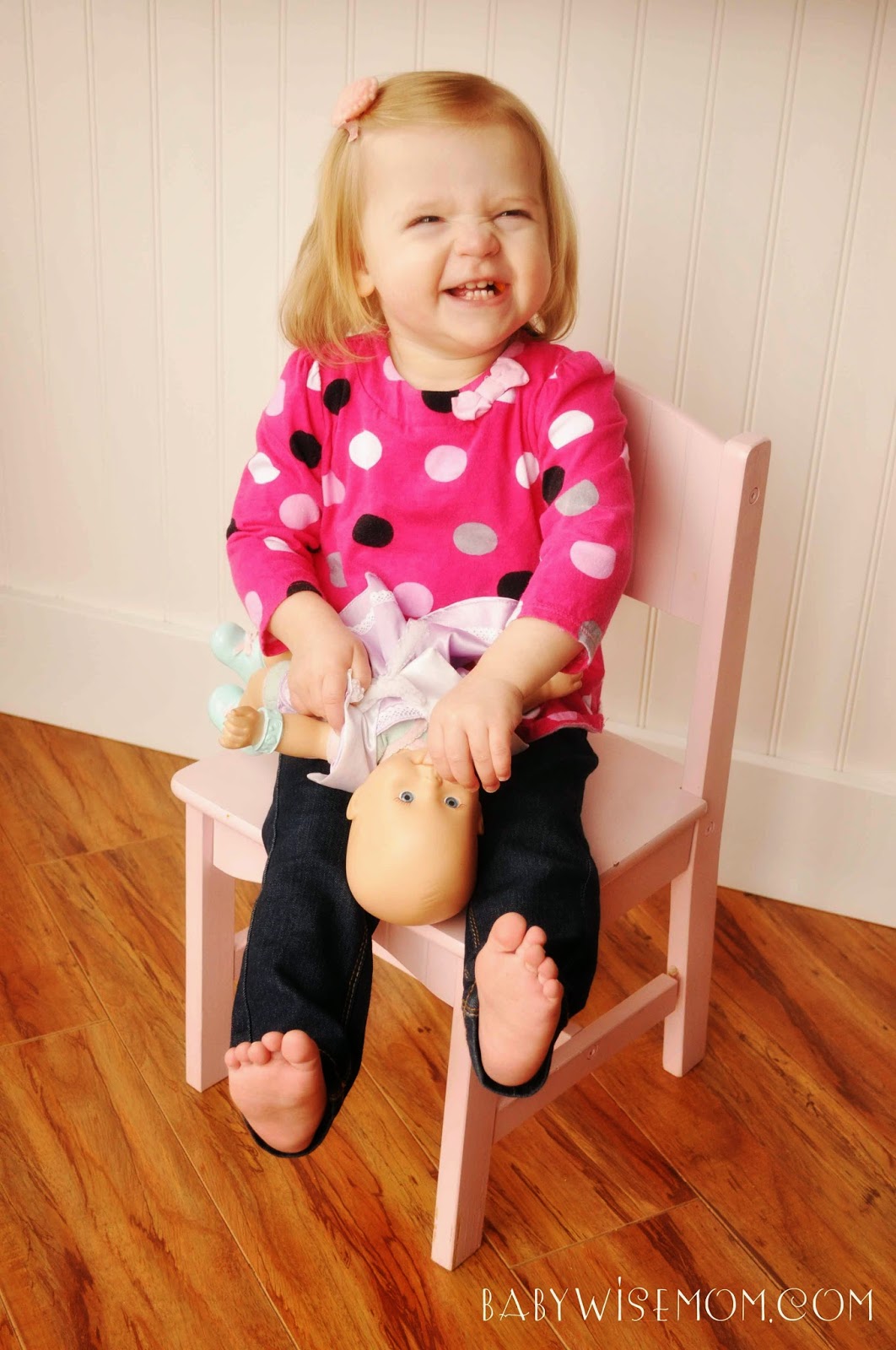Routine and schedule to do with toddlers. Get ideas on how to structure your day and do more than just make it through each day. Do more than survive–THRIVE!

When I had my first baby, I spent a good portion of the first six months of his life just hanging on there. I was pretty much just trying to make it through each day. If you have read my blog much, you probably know I didn’t start Babywise with him from birth and I spent a lot of time feeling like we were playing catch up. I think, also, with that first baby it is just hard. Most of us have never in our lives had something so dependent upon us for life. Most of us have never before been so isolated at home all day every day. There is a big learning curve with becoming a mom.
As I got a grip on things, I was able to start adding stuff so we were doing more than just making it through each day. As I started writing this blog, I wanted to help other moms do more than just make it through the day, also. I wanted to help moms thrive through their days. And so in 2009 I wrote a series on “More Than Making it Through the Day.” I left off at 18 months, and so today I write on more than making it through your day with an 18-24 month old.
I probably lost focus on the series at this stage because it is really one of my favorite stages. Newborn time is hard for me, but toddler time is delightful. Yes, they throw a lot of tantrums, but those tantrums don’t bother me.
These toddlers can be a real challenge. Most are challenging. You want to make sure you don’t let any hard work you have put in up to this point get lost by giving up a little. A way to make sure you don’t lose ground is to set some goals for you and your child during this time period. This is how you do more than just make it through the day. Do not overwhelm yourself with too many goals at once–work on what seems appropriate at the time. Remember, this post is covering six months of your child’s life. It doesn’t all need to be focused on in one day. Let’s talk about major points in the day.
Post Contents
MEALTIMES
- Spoons and Forks: If your child is not feeding herself yet with a spoon and/or fork, choose a time to allow your child to practice. Know that it is a messy learning process. Expect and accept it. By 24 months, your child should be able to eat with at least a spoon if you allow it to happen.
- Food Amounts: Know that your child will likely not eat much, at least at some meals. Toddlers can seem scary in how little they eat at times! Your child will not starve herself. Offer the food, limit snacks between meals, and let her listen to herself when she is full. If you don’t allow snacking between meals, she will eat well at meals if she is hungry. I have had some toddlers eat basically a tablespoon of food at meals and some pound in more food than I can. These kids know if they are hungry.
- Booster Seat: Your toddler will likely want to ditch the high chair and move to a booster seat at the dinner table (at the dinner table; I am not talking the car). This is a fun time because you can free up space in your kitchen!
- Picky Eaters: Watch for the picky eater being developed during this time. Your toddler is going to get an opinion. Do not start anything you don’t want to keep up long-term. Do not make more than one meal. Do not allow your child to refuse all fruits and veggies. I think we are all entitled to like or not like some fruits and veggies, but we should have have some we like, too.
See these posts:
- Correct Food Portions for Kids from Baby-8 Years
- Mealtime Booster Seats
- Mealtime Offenses (and Defenses)
- Refusal of Favorite Foods
SLEEP TIMES
Your child should be down to one nap by now. A couple of mine went to one nap during this time period.
- Dropping Naps: A Quick Reference
- Dropping the Morning Nap (from 2 to 1 naps): Transition Time
- In Action: Dropping the Morning Nap
- Timing Naps for Toddlers
- Playing in the Crib/Bed Instead of Sleeping
- Overstimulation for Toddlers
Many toddlers start to try to add in various delay tactics before naps or bedtime at this age. Don’t go into survival mode and try to give your toddler whatever she asks for just so she will go to sleep peacefully. The child will add more and more things over time if you start allowing her to set the routine.
There are things you can add or change. Brinley wanted to change her bedtime song during this time. No biggie. Brinley also wanted to add kisses and hugs to every member of the family. That is a sweet thing to add. But she likes to take it to “I will go give kisses, then once I am in my room, I will insist on hugs, also.” We make sure kisses and hugs happen at the same time. She gets one round with the family :). Every one of my children has had a period of delay tactic efforts. This is a normal development in childhood. Brayden and Brinley were much more valiant in their efforts while Kaitlyn and McKenna were more half-hearted.

INDEPENDENT PLAYTIME
Your toddler will likely be in roomtime instead of just a pack and play. Some do this at age 2 or a bit older, but many do it during this range (if not earlier).
Your child might learn to open doors. Your child might start to “ransack” the room during independent play. You still want to have boundaries and rules on this activity. Do not lose your ground by allowing “anything goes” for independent playtime.
If you haven’t added this to your day yet, do it! It can be done at any age. See these posts for more:
- Benefits of Independent Play
- Falling Asleep During Independent Playtime
- Independent Playtime: The Ultimate Overview
- Independent Playtime Lengths
- Ransacking During Independent Playtime
- Resistance to Independent Playtime
- Roomtime: Structured Playtime Alone for Kids
- Starting Independent Playtime Late
- Won’t Stay in Independent Playtime
FREE PLAYTIME
Allow your child some time each day to have some free play where she gets to decide, within reason, what to do. See Free Playtime for more.
SIBLING PLAYTIME
If your toddler has siblings, have time each day for her to play with the sibling. You can have this be part of your free time or as a structured activity. When my children were younger, I had sibling play be structured, but with my younger two, their time with siblings has been more free. This is because I can trust the older children to be responsible during playtime. See Structured Playtime With Siblings for more.
CLEANING TIME
Do some of your chores each day with your child. She will want to do everything you do. This is a powerful age range to lead by example. It is a million times harder to do any task with a toddler in tow, but there are great benefits from letting your toddler tag along. See
- How to Raise a Child Who is a “Good Helper”
- 8 Rules for Kids Chores at Home
- Teaching Children to Care for Possessions
ONE-ON-ONE TIME WITH PARENTS
We love to do dates with our kids. This is an age you can start doing “dates” with your child to make sure you get some one-on-one time. If it is just you and your child together most of the time, you don’t necessarily need an official date, but do try to have time when you are consciously spending it with your child. This is time when you aren’t reading a book, pursuing Pinterest, or checking in on Facebook. This is just you and your child.
Dates with this age group are easy. Going for a walk is a good one. You could plan a date to read book after book together. You can go to the park. These children are very easily pleased 🙂 See 13 Parent Child Date Ideas for more.
FRIEND TIME
Your toddler will still be a tandem player at this age. This means that playing is done more in the same room than interactively. This will be especially true if the child being played with is the same age. Children this age are not cooperative beings.
Right around 18 months, most toddlers grow into a stage of not wanting to share. This is totally normal. A man I know pointed out that a child has to learn to be selfish before he can learn to share. A child isn’t sharing if he doesn’t feel possession over something. You will need to work with your child on sharing during this age range. Be respectful of your child; sharing doesn’t have to mean one child gives up a toy as soon as another child wants it. Your child will like sharing better if realistic, real-life rules are set for sharing.
FAMILY TIME
As you go through each day, spend time together as a whole family. Eat at least one meal together. Do fun things together. Go for walks together. Have fun together as a family.
>>>Read: More Than Making it Through the Day: 15-18 Months
BATH TIME
Bath time can be a fun part of your day. You can add in fun things like bubbles or bath paints. My first three children loved to take baths and would take long ones. Brinley is more of a 10-15 minute bather. I don’t stress out about her not wanting to take a long bath. There are plenty of other things we can do in the day.
OUTSIDE TIME
Spend some time outside each day. Think of things you can do in any weather. Your child might like a balance bike, tricycle, or plasma car at this age range.
ART TIME
You can have art time in your day. You can think of the broad spectrum of arts. Sing, listen to music, dance, or draw. There are a lot of learning ideas on the internet these days.
LEARNING ACTIVITIES
With that in mind, try to work in some learning time each day. For this age range, I find it helpful if you go with what your child is focusing on learning. For example, Brinley has been obsessed with colors for a while now. She was determined to learn her colors. Developmentally, most children learn colors around age 3. I let her have her obsession, however, and we did activities revolving around colors. At first, she bombed the activities. Over time, she got to be very good at her colors and learned them all.
If your child doesn’t have an area of focus, just rotate through different activities you find that are age appropriate. Never forget about good old coloring. It is a great classic and builds fine motor control in the hands.
Don’t discount singing fun songs, the ABCs, reading nursery rhymes, and other similar activities as learning moments. Also, look for learning moments in play. Maybe you can count how many socks you put on each day. Maybe you can say the color of the shirt you put on each day. These are simple little things you can do to make your day more than just survival. See these posts for more:
- Book Review: The Toddler’s Busy Book
- Parenting Toddlers: a Critical Phase of Learning
- Factors that Influence Learning
- Learning Activity of the Day
- The Learning Process (Toddlerwise)
- Nurturing Natural Talents and Abilities in Our Kids
- Read 30 Minutes a Day
LANGUAGE DEVELOPMENT
Your toddlers language will explode during this time. Talk to your child often. Talk, talk, talk. Also, be sure to read each day. Reading is huge in helping to build vocabulary.
MORAL TRAINING
Remember your moral training during this time. We are talking self-control, obedience, manners (please, thank you), patience, etc. Teach your child to say “Yes Mom” as much as possible (many do not say sentences yet, so a “yes” or a “mommy” is fine). These are all works in progress; don’t expect perfection. I promise the effort to do this young will pay off! See these posts for more:
- Actions Precede Beliefs
- The Choice Addiction (for Toddlers)
- Commanding Obedience within Reason
- Controlling the Young Temper
- Discipline: Progress is a Spiral
- Hand Folding: Establishing Self-Control
- How To Stop a Tantrum
- Why You Should Teach Your Toddler to Have Self-Control NOW
- Teach What Obedience Looks Like
- Toddlers: You’re Being Too Easy if He’s Not Throwing Fits
- Toddler Tantrums
SPIRITUAL TRAINING
Remember to have prayers each day. Pray over food. Pray before bed. Your child will just sit with eyes open for a while, but during this age range, your child will start to fold arms or clasp hands. Your child will start to bow her head. Your child might even start to add her own “amen” to the prayer. Lead by example here.
POTTY TRAINING
You might enter the world of potty training during this time. Many people claim an 18 month old is easier to potty train than a 24 month old. I like to have the child be eager to potty train before I start it, but many love doing it at 18 months.
See these posts for more:
- How To Get Your Little One To Pee or Poop on the Potty
- Potty Training and Accidents
- Potty Training and Your Routine
- 5 Tips to Make Potty Training a Little Easier
- Babywise Mom Potty Training Method
- Potty Training: More Than One Right Method
- Potty-Training Using the “Oh Crap!” Method
Related Posts

